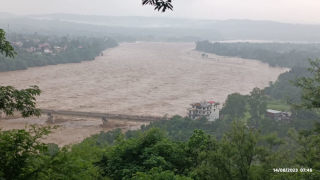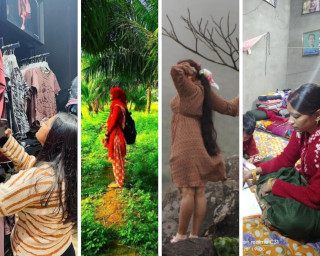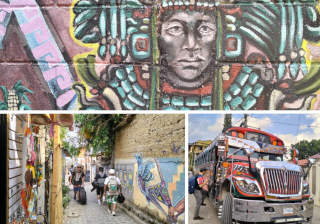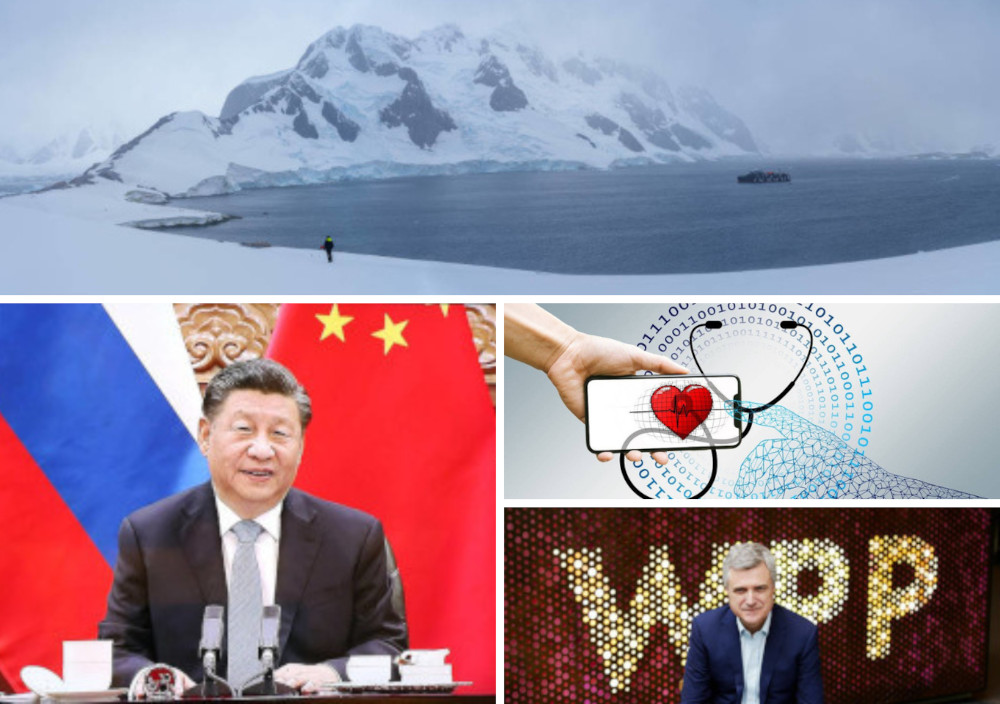Good morning and a happy Christmas and New Year!
As the year draws to a close and we take our customary year end break till January 2, 2024, we took stock of our work through the year.
Here are 12 of our best stories—in Founding Fuel and FF Life, the weekend edition of our newsletter.
We urge you to explore these stories over the holidays.
‘Tis the season of joy and sharing! If you enjoyed this curated Best of Founding Fuel 2023 list, show us some love. Consider making a generous voluntary contribution to help us produce more stories that help you make sense of our world. You will find details on how to access our premium content here and the payment link at the bottom of this page.
Have a great holiday!
Team Founding Fuel
The best of Founding Fuel in 2023
1. China's economic shift: Politics trumps growth

[By Kremlin.ru, CC BY 4.0, via Wikimedia Commons]
Despite the slowdown in its economy, Xi Jinping has not intervened with a stimulus package. The reason is a big shift in his policy, which is focused on building self-reliance. And this China Dream calls for patience and collective sacrifice by the Chinese nation.
G Venkat Raman, who is a Fulbright Fellow, Schar School of Policy and Government, George Mason University, writes: “JP Morgan analysts said China was going through ‘Japanification’, a protracted period of ‘deflation, economic sluggishness, decline in the property market and financial stress for individuals, companies and governments trying to deleverage after a debt binge.’ Some argued that China has reached its peak and will slide in the years to come. Some others are cautiously optimistic and expect China to ‘muddle through’ its current woes and stage a recovery.
Many experts are missing a crucial point. China has been making a big shift in its policy over the past few years. One of the key elements of that policy is to focus on investing in economic and technological modernisation to build self-reliance. By doing so, Chinese leaders believe the country can immunise itself from external shocks like the one it has been subjected to by the Trump administration which introduced measures to disrupt the tech value chains. And importantly, the shift aligns with Xi’s political aim of national rejuvenation and ideological resurrection.”
Read the full story
2. Thompson ad mortem. Who cares?

[Mark Read, Chief Executive Officer, WPP]
Why did WPP decide to snuff out the identities of three of its most storied agencies—Thompson, Y&R and Wunderman—to create a new entity VML, the world’s largest creative company? The clues lie in the stock markets—and the immense pressures acting on its CEO Mark Read.
Shekar Swamy, the CEO of R K SWAMY HANSA, writes: “WPP is an aggregator of companies. It has one master, the stock market. The CEO of WPP gets to keep his job as long as he delivers value to investors, mostly institutions. This applies to other holding companies as well.
The developments on the tech front with dominating platforms, the intersection of marketing and technology, and the incursion of consulting companies into advertising/marketing services have forced the agency holding companies to respond to this new ecosystem. The stock markets have been merciless in their assessment of the four major holding companies — WPP, Omnicom, Publicis and Interpublic (IPG). The combined market cap of the four companies today is between $55 billion to $60 billion, a far cry from their pre-Covid peak. A famous valuation guru recently called them zombie companies, as far as the stock price was concerned. (Note: The fifth major company Dentsu, because of its sheer dominance in Japan, is considered an outlier and not included here.)
WPP was once the most valued company of this pack. It has since lost that position....
It is common wisdom that when personal threats loom, people react urgently. CEOs are noted to do this. Read has to communicate to the markets that he is acting swiftly to correct the situation.”
Read the full story
3. Noel Tata's brahmastra

His value lifestyle brand Zudio has caught the attention of the entire retail industry. It also signals a coming of age of retail in small town India.
Indrajit Gupta, co-founder Founding Fuel, writes: “Zudio is rapidly spreading its wings across more than 120 locations and is likely to touch more than 500 stores by 2023. Many of these locations weren’t even on India’s retail map till now: Dimapur, Ujjain, Imphal, Pathankot, Gorakhpur, Hapur, and Madhyamgram, to name just a few. With 15-20 stores being added every month—and each new store generating significant traction—it isn’t inconceivable that Zudio will double revenues to Rs 5,000 crore in the next two to three years...
Zudio is a Turns Retailer—industry-speak for retailers with low markups and high inventory turns...
It signals the coming of age of India’s new consuming classes."
Read the full story
4. A river in spate, landslides, and nature's fury

[The Beas at Nadaun on August 14, 2023.]
Climate change as manifested in the devastating rain and flash floods, and growing urbanisation is slowly but surely changing a way of life in Himachal Pradesh.
Sveta Basraon, who is part of the Founding Fuel founding team, writes: “My village in Hamirpur district, close to the border with Mandi district, and my sister’s town on the northern border with Kangra district, are not places that you’d hear about in the national news…
Not much happens in the village that’s out of the ordinary. And the same goes for my sister who lives near Nadaun—a historical town mentioned in Sufi poet Bulleh Shah’s poem “Bulla Ki Janna Mein Kaun”.
But all that’s been changing over the last few years.
For the first time ever, my sister’s mango orchard has not a single mango, as all the flowers fell during the unseasonal rains earlier this year....
In my village, change has taken a slightly different shape… while life is easier, an entire way of life is getting lost. There’s less farming, and no one keeps cattle beyond a cow or two, so there’s less need to get fodder. As a result, the jungle is slowly creeping into the village.”
Read the full story
5. Educated, aspiring, but struggling for opportunities

In this Ground Realities report, Piyul Mukherjee, Co-Founder, Quipper Research Private Limited, and Sharmistha Adyanthaya, Mehek Kukreja and Rashi from Quipper recount the stories of four women who are among the many who fall into the gap between ‘Ladki Padhao’ (educate girls) and ‘Naukri Karvao’ (allow them to work)
One of the women they write about is Karina Khatun, a college topper who is struggling to find job opportunities.
"Karina would love to have a career that utilizes all of her complex analytical ability. ”I love anything with numbers and related concepts. But I don’t know where to apply.”...
“When I was in Uccho Madhyamik (XIIth std), my earlier village school headmistress called me to meet her,” recalls Karina. “Krishna di (the headmistress) was desperate. The mathematics teacher had gone on long leave for weeks, there was no temporary replacement available.”
The school adjusted the arithmetic classes of standards seven to ten to suit Karina’s college timings, and she came in to teach each morning.
“The first day I was rather surprised and puzzled at the reception the students gave me,” says Karina. “Each class of girls came and surrounded me, wanting to touch me.”
The reason? Karina Khatun’s large photograph was on proud display in the school assembly hall, as an all-time topper. Her teachers spoke of her often in class as a stellar example and each student felt they knew her already.
Two months later, when the usual math teacher was back, the girls surrounded Karina once again. In tears this time…
As Karina pores over one more entrance examination announcement, she avers that she can get a job as a schoolteacher in any of the mushrooming non-governmental private schools. At a salary of Rs 11,000 working double shifts…. But she wants to know, “I feel that with my understanding of applied mathematics, I can do much, much more in life. Don’t you?”
Read the full story
6. How (not) to build your personal brand

The power of social media has lulled leaders into believing that a carefully curated digital identity is the sure-fire passport to success. They are entirely off-the-mark.
Indrajit Gupta writes: “Let me be upfront. I’ve remained ambivalent about the role of a strong personal brand and the need for deliberately and consciously building it… personal branding to me has been more about discovering a purpose, building substance and being authentic, and less about showbiz, razzmatazz and flaky communication.
Thus, it would be fair to label me as a sceptic. So to avoid succumbing to my own biases, the next thing I did was to have a set of freewheeling conversations with three people—Kavi Arasu, Raj Bowen and D Shivakumar—whose views I respect.”
Here’s one of the insights that emerged:
“Start by working on yourself: Finding a social media expert who can teach you how to build your profile on LinkedIn, Twitter or Instagram is the easy part. Figuring out who you are and what you stand for takes focus and attention. A good coach can play a key role. Don’t try winging it yourself, especially if you can afford to employ a good coach. Yet, many leaders have misconceptions about the process of coaching. Coaches don’t provide answers. They ask good questions that make you think harder. If you’re looking for expertise of some sort, find a mentor instead.”
Read the full story
The best of FF Life in 2023
1. Journey to the great white continent

Meenakshi Ramesh, Executive Director, United Way of Chennai, takes us on a journey to a land of extreme weather, majestic landscape, and rich wildlife.
She writes: "Nothing, absolutely nothing, could have prepared me for the first morning glimpse of Antarctica. Majestic. Spectacular. Jaw-dropping. Superlatives don’t cut it. White as far as the eye can see. Mountains covered in ice, massive ice shelves, some of them a hundred feet high, icebergs that stand in the middle of the ocean, in amazing shapes, and a breathtaking shade of blue (the ice is so tightly compacted that when light falls on it, it absorbs all colours except blue, so all icebergs and ice shelves look blue to the human eye). Straight out of Nat Geo. I have goosebumps as I look at this magnificent display of Nature, humbled by the realisation that some of this ice has been here for millions of years."
Read the full story
2. Guate Maya

“Travelling slow through Guatemala, I experienced a culture hidden from the typical tourist,” writes Piya Bose, Founder, Girls On The Go & Cave of Plato
One of the cities she visited was Antigua Guatemala. She writes: “Every wobbly step in Antigua past cotton-candy-coloured houses felt like I was walking into a time warp. Two eras seemed superimposed. One, fast paced that stimulates the senses. The other, slow and soothing for the senses.
Only the sound of fast-paced yet soothing clapping of hands as women flattened tortillas balanced time between two opposing timelines like a metronome.
The clatter of horse carriages here mingled with the zooming of modern-day cars. Ancient ruins formed the backdrop of modern rock concerts.
Somewhere at this juxtaposition of two different rhythms, I was hoping to rediscover myself.”
Read the full story
3. Story of a love affair

Charles Assisi, co-founder, Founding Fuel, writes about "a bicycle that’s built only for me" — and the engineering and art behind it.
He writes: “When a custom-built bicycle landed home on my 50th birthday, to put it bluntly, I was surprised. Bicycles had fallen off my radar after I got into the workforce almost 30 years ago, because there appeared to be “no time” to cycle around randomly. My only relationship with bicycles since was restricted to reading stories of endurance and peak performance from races such as the legendary Tour de France…
But one look at this bicycle and I knew she was different....Clearly, this was built only for me and it would take a while to wrap my head around the fact that I am dealing with not just a bicycle, but a work that is both engineering and art that had taken much thinking to create.”
Read the full story
4. Personalised medicine and healthcare

Digital therapeutics holds great potential and is finding many takers, writes Charles Assisi.
"I had never imagined that my smartphone would help me turn into a non-smoker after having been one for over two decades. For that matter, I had no idea that the new generation of smartphones are devices pushing the boundaries of medicine, and meet the approval of globally acknowledged regulatory authorities such as the World Health Organization (WHO) or America’s Federal Drug Administration (FDA)....
"I’ve tried to quit smoking in the past. The longest I could stay away was three months and it was always a battle of will. This time around, I’m not fighting any urge... Things are now at a point where I actually feel repulsed by cigarettes. My identity and behaviour has fundamentally changed. I don’t think of myself as a smoker any longer."
Read the full story
5. The international school conundrum

A new, growing set of international schools in India offer the allure of a contemporary and modern educational experience and well-rounded development of your child. But are they really able to live up to that promise, asks Ambica Naithani? Ambica is an educator at international schools.
She writes: “Choosing between the Cambridge and IB boards is still not an easy decision for many parents. Especially for those who want to send their kids abroad for higher studies....
To put it mildly, these schools are expensive even for an upper middle class family. But costs aside, there are very good reasons why these schools could emerge as alternatives to CBSE and ICSE schools. Equally, there are many myths and misconceptions associated with these international boards as well."
In this column she provides a balanced perspective, based on her teaching experience, on what to watch out for—and some of the key questions that are worth asking.
Read the full story
6. One sip at a time

Aayush Soni initiates us into limited-edition boutique wines. Aayush, who is an independent journalist and holds a Wine and Spirits Education Trust (WSET) level 2 certificate, writes:
“The course converted me from an ill-informed wine buyer into an informed wine enthusiast…
Admittedly, there are very few true enthusiasts in India. They have had their fill of conventional varieties like a Cabernet Sauvignon, Chenin Blanc, Sauvignon Blanc, Merlot and Pinot Noirs, and are now ready to try out new styles of wine that challenge conventions. For instance, one of the wines in [importer Vishal] Kadakia’s portfolio is a white wine from the Little James Basket Press winery, located in France’s Rhone region. It is a blend of Sauvignon Blanc and Viognier, two grapes that normally are not blended together. But in this lemon-hued wine, the stone-fruit flavours of the latter balanced the herbaceousness of the former. In fact, the WSET textbook says that Semillon should be blended with Sauvignon Blanc but this particular combination surprised both my palate and the wine trainer conducting the course.”
Read the full story
The best of the previous years
‘Tis the season of joy and sharing! If you enjoyed this curated Best of Founding Fuel 2023 list, show us some love. Consider making a generous voluntary contribution to help us produce more stories that help you make sense of our world. You will find details on how to access our premium content here and the payment link below.


